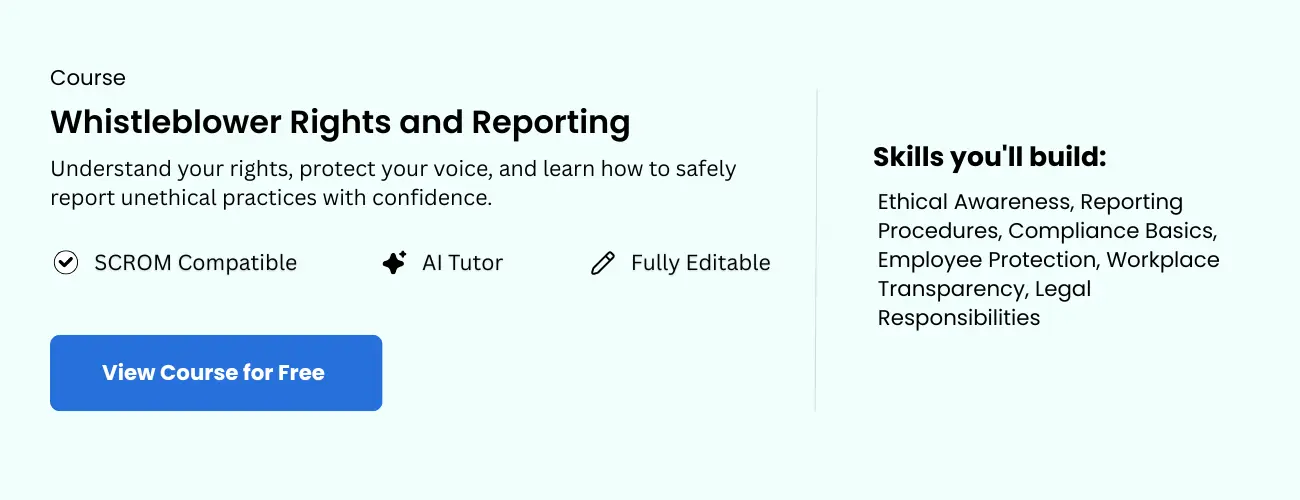What Is Whistleblowing?
Whistleblowing is the act of reporting illegal, unethical, or dangerous conduct within an organisation so that harm can be prevented, corrected, or investigated. Whistleblowers are usually insiders employees, vendors, or contractors who notice wrongdoing such as fraud, corruption, safety risks, environmental issues, or regulatory non-compliance and decide to report it. Providing whistleblower training for employees ensures they understand how to recognise misconduct and report it safely and responsibly.
Whistleblowing is essential for transparency and accountability in the workplace. But a common concern is this: what happens if the whistleblower is wrong? This blog explains whistleblowing, its importance, and the consequences of incorrect or mistaken reports, while also highlighting how whistleblower training for employees helps reduce false claims and strengthens ethical reporting.
Why Whistleblowing Matters
A strong whistleblowing system helps organisations:
- Identify fraud and misconduct early.
- Prevent workplace accidents by reporting safety issues.
- Stay compliant and avoid legal penalties.
- Build a culture of honesty and accountability.
Types of Whistleblowing
- Internal Whistleblowing: Reporting concerns to a manager, HR, compliance team, or internal hotline.
- External Whistleblowing: Reporting issues to regulators, law enforcement, or sometimes the media.
- Anonymous Whistleblowing: Using anonymous channels to safely report concerns without revealing identity.
Legal Protections for Whistleblowers
Most whistleblower protection laws safeguard individuals who report misconduct in good faith. This means they genuinely believed the wrongdoing was real—even if it turns out to be a misunderstanding.
Common protections include:
- Protection from retaliation (termination, demotion, harassment).
- Confidential handling of their identity.
- Rights to compensation if they face unfair treatment.
Good-faith reporting is protected even if the allegation is later proven incorrect.
What Happens If a Whistleblower Is Wrong?
This depends entirely on the whistleblower’s intent and whether they acted responsibly.
1. Good-Faith Incorrect Reports
If a whistleblower genuinely believed something was wrong but the investigation reveals no misconduct, they are typically protected under the organisation’s policies and the law. They should not face punishment or retaliation.
2. Malicious or False Reporting
If someone knowingly makes a false allegation to harm a colleague or the organisation, they may face serious consequences, including:
- Disciplinary action or termination.
- Legal liability (in cases like defamation).
- Loss of trust and professional credibility.
How Organisations Should Handle Investigations
- Receive and assess the report.
- Gather evidence through interviews, documents, and system data.
- Analyse findings to determine if misconduct occurred.
- Take action — corrective, disciplinary, or closure based on results.
A transparent and fair investigation builds trust in the reporting system.
Tips for Employees Before Reporting
- Document facts, dates, and observations.
- Review company policies to understand the rules.
- Stick to facts instead of assumptions.
- Use official reporting channels rather than informal complaints.
- Report anonymously if you fear retaliation.
How Organisations Can Reduce False Reports
- Clear whistleblower policies with examples of reportable misconduct.
- Training programs that teach employees how and when to report.
- Anonymous hotlines for safe and confidential submissions.
- Non-retaliation guarantees to encourage honest reporting.
- Consequences for malicious reports to protect system integrity.
Real-World Risks and Benefits
When whistleblowing is done correctly, it prevents fraud, workplace accidents, legal violations, and ethical breaches. Companies save money, protect reputations, and build trust.
But if mishandled, incorrect reports—especially malicious ones—can damage careers, cause unnecessary investigations, and create fear in the workplace.
The Role of Training
Training ensures employees understand:
- What misconduct looks like.
- How to report safely and accurately.
- What protections they have.
- How to avoid false or harmful reports.
Explore whistleblowing and compliance training courses to strengthen your organisation’s reporting culture.
Must Read: 5 Common Myths About Whistleblowing You Need to Stop Believing
Conclusion
Whistleblowing is a powerful tool that protects organisations and society. Employees who report in good faith—even if mistaken—are generally protected. Only those who intentionally make false claims face serious consequences.
A culture of trust, clear policies, and strong training programs ensures that employees feel safe to speak up while minimising incorrect reports. With the right processes in place, whistleblowing becomes a pathway to integrity, safety, and long-term organisational success.
























